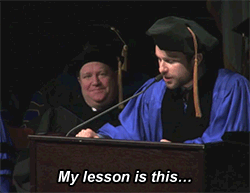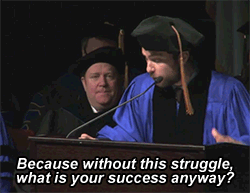Smparticle2 - Untitled


More Posts from Smparticle2 and Others










Never be afraid to fail.
Watch all of ‘It’s Always Sunny in Philadelphia’s" Charlie Day’s inspiring commencement speech here.













The Landscapes and Skylines of Howl’s Moving Castle ハウルの動く城




“That is the one unforgivable sin in any society. Be different and be damned!” -Rhett Butler
It’s a terrible thing, I think, in life to wait until you’re ready. I have this feeling now that actually no one is ever ready to do anything. There is almost no such thing as ready. There is only now. And you may as well do it now.
Hugh Laurie (via liberatingreality)
The Beauty of Webb Telescope’s Mirrors
The James Webb Space Telescope’s gold-plated, beryllium mirrors are beautiful feats of engineering. From the 18 hexagonal primary mirror segments, to the perfectly circular secondary mirror, and even the slightly trapezoidal tertiary mirror and the intricate fine-steering mirror, each reflector went through a rigorous refinement process before it was ready to mount on the telescope. This flawless formation process was critical for Webb, which will use the mirrors to peer far back in time to capture the light from the first stars and galaxies.

The James Webb Space Telescope, or Webb, is our upcoming infrared space observatory, which will launch in 2019. It will spy the first luminous objects that formed in the universe and shed light on how galaxies evolve, how stars and planetary systems are born, and how life could form on other planets.
A polish and shine that would make your car jealous

All of the Webb telescope’s mirrors were polished to accuracies of approximately one millionth of an inch. The beryllium mirrors were polished at room temperature with slight imperfections, so as they change shape ever so slightly while cooling to their operating temperatures in space, they achieve their perfect shape for operations.

The Midas touch
Engineers used a process called vacuum vapor deposition to coat Webb’s mirrors with an ultra-thin layer of gold. Each mirror only required about 3 grams (about 0.11 ounces) of gold. It only took about a golf ball-sized amount of gold to paint the entire main mirror!

Before the deposition process began, engineers had to be absolutely sure the mirror surfaces were free from contaminants.

The engineers thoroughly wiped down each mirror, then checked it in low light conditions to ensure there was no residue on the surface.

Inside the vacuum deposition chamber, the tiny amount of gold is turned into a vapor and deposited to cover the entire surface of each mirror.

Primary, secondary, and tertiary mirrors, oh my!
Each of Webb’s primary mirror segments is hexagonally shaped. The entire 6.5-meter (21.3-foot) primary mirror is slightly curved (concave), so each approximately 1.3-meter (4.3-foot) piece has a slight curve to it.

Those curves repeat themselves among the segments, so there are only three different shapes — 6 of each type. In the image below, those different shapes are labeled as A, B, and C.

Webb’s perfectly circular secondary mirror captures light from the 18 primary mirror segments and relays those images to the telescope’s tertiary mirror.

The secondary mirror is convex, so the reflective surface bulges toward a light source. It looks much like a curved mirror that you see on the wall near the exit of a parking garage that lets motorists see around a corner.

Webb’s trapezoidal tertiary mirror captures light from the secondary mirror and relays it to the fine-steering mirror and science instruments. The tertiary mirror sits at the center of the telescope’s primary mirror. The tertiary mirror is the only fixed mirror in the system — all of the other mirrors align to it.

All of the mirrors working together will provide Webb with the most advanced infrared vision of any space observatory we’ve ever launched!
Who is the fairest of them all?
The beauty of Webb’s primary mirror was apparent as it rotated past a cleanroom observation window at our Goddard Space Flight Center in Greenbelt, Maryland. If you look closely in the reflection, you will see none other than James Webb Space Telescope senior project scientist and Nobel Laureate John Mather!

Learn more about the James Webb Space Telescope HERE, or follow the mission on Facebook, Twitter and Instagram.
Make sure to follow us on Tumblr for your regular dose of space: http://nasa.tumblr.com.

(Image caption: Young neurons (pink), responsible for encoding new memories, must compete with mature neurons (green) to survive and integrate into the hippocampal circuit. Credit: Kathleen McAvoy, Sahay Lab)
Making memories stronger and more precise during aging
When it comes to the billions of neurons in your brain, what you see at birth is what get — except in the hippocampus. Buried deep underneath the folds of the cerebral cortex, neural stem cells in the hippocampus continue to generate new neurons, inciting a struggle between new and old as the new attempts to gain a foothold in the memory-forming center of the brain.
In a study published online in Neuron, Harvard Stem Cell Institute (HSCI) researchers at Massachusetts General Hospital and the Broad Institute of MIT and Harvard in collaboration with an international team of scientists found they could bias the competition in favor of the newly generated neurons.
“The hippocampus allows us to form new memories of ‘what, when and where’ that help us navigate our lives,” said HSCI Principal Faculty member and the study’s corresponding author, Amar Sahay, PhD, “and neurogenesis—the generation of new neurons from stem cells—is critical for keeping similar memories separate.”
As the human brain matures, the connections between older neurons become stronger, more numerous, and more intertwined, making integration for the newly formed neurons more difficult. Neural stem cells become less productive, leading to a decline in neurogenesis. With fewer new neurons to help sort memories, the aging brain can become less efficient at keeping separate and faithfully retrieving memories.
The research team selectively overexpressed a transcription factor, Klf9, only in older neurons in mice, which eliminated more than one-fifth of their dendritic spines, increased the number of new neurons that integrated into the hippocampus circuitry by two-fold, and activated neural stem cells.
When the researchers returned the expression of Klf9 back to normal, the old dendritic spines reformed, restoring competition. However, the previously integrated neurons remained.
“Because we can do this reversibly, at any point in the animals life we can rejuvenate the hippocampus with extra, new, encoding units,” said Sahay, who is also an investigator with the MGH Center for Regenerative Medicine.
The authors employed a complementary strategy in which they deleted a protein important for dendritic spines, Rac1, only in the old neurons and achieved a similar outcome, increasing the survival of the new neurons.
In order to keep two similar memories separate, the hippocampus activates two different populations of neurons to encode each memory in a process called pattern separation. When there is overlap between these two populations, researchers believe it is more difficult for an individual to distinguish between two similar memories formed in two different contexts, to discriminate between a Sunday afternoon stroll through the woods from a patrol through enemy territory in a forest, for example. If the memories are encoded in overlapping populations of neurons, the hippocampus may inappropriately retrieve either. If the memories are encoded in non-overlapping populations of neurons, the hippocampus stores them separately and retrieves them only when appropriate.
Mice with increased neurogenesis had less overlap between the two populations of neurons and had more precise and stronger memories, which, according to Sahay, demonstrates improved pattern separation.
Mice with increased neurogenesis in middle age and aging cohorts exhibited better memory precision.
“We believe that by increasing the hippocampus’s ability to do what it supposed to do and not retrieve past experiences when it shouldn’t can help,” Sahay said. This may be particularly useful for individuals suffering from post-traumatic stress disorder, mild cognitive impairment, or age-related memory loss.

Ad Astra, John Glenn (1921-2016)
An astronaut.
A pilot.
A husband.
A father.
A United States Senator.
An American hero.
An original.

John Glenn (1921-2016) was all those things and more. When he rocketed into space on Feb. 20, 1962, to become the first American to orbit Earth, the flight set the nation on course to meet ever-more ambitious goals.
The life and career of Senator Glenn eclipses those of many. In spite of his accomplishments, he was a humble and gracious man (and 4-term U.S. senator).
During Glenn’s first flight, a scheduled 30-minute test to determine whether Glenn could fly the capsule manually became a matter of life and death when the automatic system malfunctioned after the first orbit.

“I went to manual control and continued in that mode during the second and third orbits, and during re-entry,” Glenn recalled later. “The malfunction just forced me to prove very rapidly what had been planned over a longer period of time.” Another problem seemed even more serious – telemetry indicated the spacecraft’s heat shield was loose. It seemed possible that Glenn and the spacecraft would be incinerated on re-entry. Glenn left the retrorocket pack in place to steady the heat shield during re-entry. “It made for a very spectacular re-entry from where I was sitting,” he said. Big chunks of the burning material came flying by the window.

He wasn’t sure whether the flaming debris was the rocket pack or the heat shield breaking up. “Fortunately,” he told an interviewer,“ it was the rocket pack – or I wouldn’t be answering these questions.”

In the words of President Obama, who awarded him the Presidential Medal of Freedom in 2012: “When John Glenn blasted off from Cape Canaveral atop an Atlas rocket in 1962, he lifted the hopes of a nation. And when his Friendship 7 spacecraft splashed down a few hours later, the first American to orbit the Earth reminded us that with courage and a spirit of discovery there’s no limit to the heights we can reach together. With John’s passing, our nation has lost an icon and Michelle and I have lost a friend. John spent his life breaking barriers, from defending our freedom as a decorated Marine Corps fighter pilot in World War II and Korea, to setting a transcontinental speed record … The last of America’s first astronauts has left us, but propelled by their example we know that our future here on Earth compels us to keep reaching for the heavens. On behalf of a grateful nation, Godspeed, John Glenn.”

Glenn left the Astronaut Corps in 1964 and resigned from the Marine Corps in 1965. And, after some time in private industry ran for and was elected ti the U.S. Senate in 1974, carrying all 88 counties of Ohio. He was re-elected in 1980 with the largest margin in Ohio history. Ohio returned him to the Senate for a third term in 1986. In 1992 he was elected again, becoming the first popularly elected senator from his state to win four consecutive terms. During his last term he was the ranking member of both the Governmental Affairs Committee and the Subcommittee on Air/Land Forces in the Senate Armed Services Committee. He also served on the Select Committee on Intelligence and the Special Committee on Aging. He was considered one of the Senate’s leading experts on technical and scientific matters, and won wide respect for his work to prevent the spread of weapons of mass destruction.

In 1998, Glenn flew on the STS-95 Discovery shuttle flight, a 9-day mission during which the crew supported a variety of research payloads including deployment of the Spartan solar-observing spacecraft, the Hubble Space Telescope Orbital Systems Test Platform, and Glenn’s investigations on space flight and the aging process.
NASA Administrator Charlie Bolden remembers, “Senator Glenn’s legacy is one of risk and accomplishment, of history created and duty to country carried out under great pressure with the whole world watching.”
Today, we honor him for all that he stood for and continues to stand for – grace under pressure, humility, ability, strength.
Godspeed, John Glenn.
-
 gin-ro2 liked this · 3 months ago
gin-ro2 liked this · 3 months ago -
 tittiesdescend liked this · 6 months ago
tittiesdescend liked this · 6 months ago -
 midnitevulture reblogged this · 6 months ago
midnitevulture reblogged this · 6 months ago -
 the-letter-horror-lover liked this · 7 months ago
the-letter-horror-lover liked this · 7 months ago -
 thedanishgayweirdo liked this · 7 months ago
thedanishgayweirdo liked this · 7 months ago -
 avidsoupfan liked this · 7 months ago
avidsoupfan liked this · 7 months ago -
 incompetentmedic liked this · 7 months ago
incompetentmedic liked this · 7 months ago -
 vianemad reblogged this · 7 months ago
vianemad reblogged this · 7 months ago -
 vianemad liked this · 7 months ago
vianemad liked this · 7 months ago -
 eltrolodecadadia reblogged this · 7 months ago
eltrolodecadadia reblogged this · 7 months ago -
 eltrolodecadadia liked this · 7 months ago
eltrolodecadadia liked this · 7 months ago -
 i-gotyou-first reblogged this · 7 months ago
i-gotyou-first reblogged this · 7 months ago -
 your-canons-cannot-sink-my-ships liked this · 7 months ago
your-canons-cannot-sink-my-ships liked this · 7 months ago -
 landruce liked this · 7 months ago
landruce liked this · 7 months ago -
 zero57x liked this · 7 months ago
zero57x liked this · 7 months ago -
 theramoretulips reblogged this · 7 months ago
theramoretulips reblogged this · 7 months ago -
 coolheartface reblogged this · 7 months ago
coolheartface reblogged this · 7 months ago -
 nihi1ista liked this · 7 months ago
nihi1ista liked this · 7 months ago -
 tanvicious liked this · 7 months ago
tanvicious liked this · 7 months ago -
 green-hound reblogged this · 7 months ago
green-hound reblogged this · 7 months ago -
 fullmetalfisting reblogged this · 7 months ago
fullmetalfisting reblogged this · 7 months ago -
 the-hollows-are-my-home reblogged this · 10 months ago
the-hollows-are-my-home reblogged this · 10 months ago -
 animesrule reblogged this · 1 year ago
animesrule reblogged this · 1 year ago -
 bluesky197 liked this · 1 year ago
bluesky197 liked this · 1 year ago -
 dopefishcollection liked this · 1 year ago
dopefishcollection liked this · 1 year ago -
 animationwhump reblogged this · 1 year ago
animationwhump reblogged this · 1 year ago -
 oof-ouch-ow reblogged this · 1 year ago
oof-ouch-ow reblogged this · 1 year ago -
 brooklell liked this · 1 year ago
brooklell liked this · 1 year ago -
 fan-dos-multiversos-blog reblogged this · 2 years ago
fan-dos-multiversos-blog reblogged this · 2 years ago -
 chocolatepizzagarden liked this · 2 years ago
chocolatepizzagarden liked this · 2 years ago -
 crowsephine reblogged this · 2 years ago
crowsephine reblogged this · 2 years ago -
 assslingingslasher reblogged this · 2 years ago
assslingingslasher reblogged this · 2 years ago -
 assslingingslasher liked this · 2 years ago
assslingingslasher liked this · 2 years ago -
 xhnd reblogged this · 2 years ago
xhnd reblogged this · 2 years ago -
 gaystation4 reblogged this · 2 years ago
gaystation4 reblogged this · 2 years ago -
 trappedinavelociraptor liked this · 2 years ago
trappedinavelociraptor liked this · 2 years ago -
 melted-gelat0 reblogged this · 2 years ago
melted-gelat0 reblogged this · 2 years ago -
 melted-gelat0 liked this · 2 years ago
melted-gelat0 liked this · 2 years ago -
 mysecretmeowmeow reblogged this · 2 years ago
mysecretmeowmeow reblogged this · 2 years ago -
 looshipoh reblogged this · 2 years ago
looshipoh reblogged this · 2 years ago -
 gaystation4 liked this · 2 years ago
gaystation4 liked this · 2 years ago -
 forvagabondsfromclown liked this · 2 years ago
forvagabondsfromclown liked this · 2 years ago -
 qatl-kardo-malika liked this · 2 years ago
qatl-kardo-malika liked this · 2 years ago -
 mrs-almost-angel liked this · 2 years ago
mrs-almost-angel liked this · 2 years ago -
 papercutsofawriter reblogged this · 2 years ago
papercutsofawriter reblogged this · 2 years ago -
 suck-a-busss liked this · 2 years ago
suck-a-busss liked this · 2 years ago

